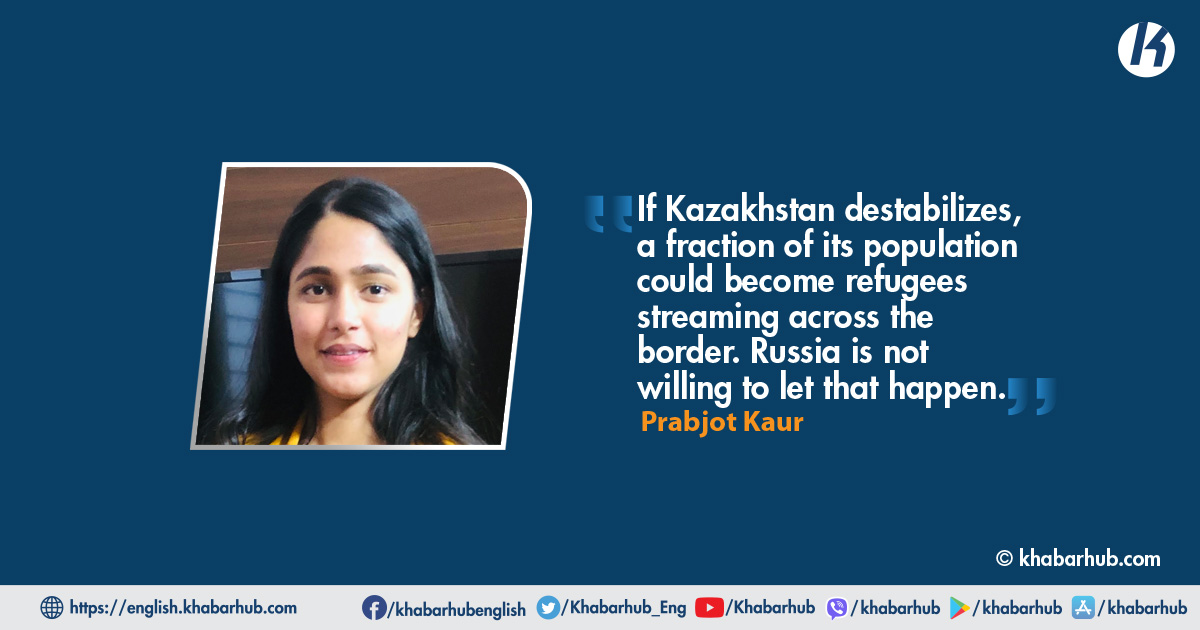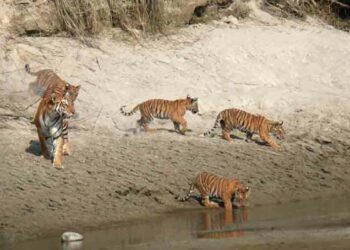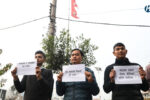Kazakhstan has been witnessing an unprecedented crisis marking the worst violence of the time since its independence some thirty years ago.
In almost a week of the protest, dozens of citizens and police officials have been killed. The interior ministry has informed of liquidating 26 ‘armed criminals’ and detaining 3000 of the citizens since last weekend.
Almaty, the state’s largest city, has reportedly been the bloodiest site for the protesters and security forces in recent days and this unrest has created a very difficult situation for the citizens, thus making the ordinary life of the city coming to a halt.
Thousands of protesters have taken to the street the biggest protest, carrying the potential to shake the autocratic regime of Kazakhstan.
The protesters stormed and torched public buildings prompting President Tokayev to declare a national emergency in the state.
This event has shaken the power seat of President Kassym-Jomart Tokayev in less than three years of his presidency.
It is a stark challenge to his regime since Kazakhstan had the reputation for political and economic stability in an unstable region, though the stability comes at the price of the government stifling dissent in the state.
Since the internet has been shut down and a communication blackout has been in place, Kazakhstan is providing a fertile ground for confusion and misinformation to thrive.
Reportedly, several armed personnel carriers and dozens of troops entered the main square of Almaty on Thursday morning to quell the dissent of hundreds of people against the government.
Kazakhstan President, Tokayev has ordered security forces to open fire without warning if the situation exacerbates with an aim to ‘destroy’ those who fail to surrender.
The protest is also significant since Kazakhstan is aligned with Russia whose president Vladimir Putin considers Kazakhstan as his sphere of influence and the simmering discontentment in the state has made Russia vigilant of the situation.
Initially sparked by a peaceful outcry over the surging fuel prices on January 2, the protest intensified into something more significant and combustible and an oil-rich country, a home to 19 million people was brought to a sudden standstill.
The protest swelled and the pervasive discontentment was directed more towards the authoritarian government and voiced out against the endemic corruption prevalent in the state where wealth is concentrated within a small coterie of political and economic elites causing economic disparities.
The protesters expanded their scope of demands from demanding lower fuel prices to political liberalization, including the direct appointment of the regional leaders rather than direct appointment by the President.
In short, the protesters want to oust the autocratic regime that has been ruling Kazakhstan without any potential opposition since its independence in 1991.
The government conceded to the few demands of the demonstrators including lowering the fuel prices, dismissing the Cabinet and possible dissolution of the Parliament and even removing Nazarbayev-who had become a primary target in the protests- as head of the country’s influential National Security Council, but the move has failed to tame the dissent.
Kazakhstan’s unprecedented crisis has forced the government to invoke unprecedented help from the Collective Security Treaty Organization (CSTO) to deal with ‘terrorists’ and for the first time, CSTO has agreed to assist Kazakhstan in placating the situation by sending their ‘peacekeeping’ forces, since its inception.
The CSTO, currently being chaired by the Armenian Prime Minister, Nikol Pashinyan has agreed to send their forces under Article 4 of the organization’s constitution, “In the case of aggression (an armed attack threatening safety, stability, territorial integrity and sovereignty) against any Member States, all other Member States at the request of this Member State shall immediately provide the latter with the necessary aid, including military.”
This is unique in ways as Article 4 is being invoked for the first time since its founding in 1994. The CSTO had denied such requests at least on two occasions in the past- Kyrgyzstan in 2010 and Armenia in 2020 and the refusals to extend help were predicated on the conflict in Kyrgyzstan to be its internal matter and a brief border dispute of Armenia with Azerbaijan.
But Kazakh President has wisely spun a narrative that ‘outside influences’ and ‘terrorist elements’ were trying to disturb the peace of the state to which the CSTO readily agreed to help.
The CSTO’s members currently include Belarus, Kyrgyzstan, Kazakhstan, Armenia, Russia and Tajikistan. On 6th January, CSTO troops reportedly have set a march to Kazakhstan.
Some reports indicated that Russia would deploy 3,000 troops, Belarus would send 500, Tajikistan had committed 200 and Armenia would send 70.
In the wake of public protests in Kyrgyzstan against sending troops to Kazakhstan, the Kyrgyz government is likely to send a limited contingent there.
In 2019, Nazarbayev stepped aside to be called the ‘leader of the nation’ hoarding enough formal and informal power for himself.
He appointed Tokayev to be his predecessor and thus, Kazakhstan has shown that you can have a leadership change without having any regime change.
It is important to note that just when NATO-Russia talks to resolve the crisis in Ukraine were set to begin, the revolution against the Kazakh government began to start. Russia perceives this to be an act of ‘hybrid war’.
This has Kazakhstan trapped within the authoritarian rule leading to limited political space and no high-profile opposition figures who can recuperate the state from the corrupt government.
The recent demonstrations are alarming since Kazakhstan represents a pillar of political and economic stability in a turbulent and volatile region.
The protest is also significant since Kazakhstan is aligned with Russia whose president Vladimir Putin considers Kazakhstan as his sphere of influence and the simmering discontentment in the state has made Russia vigilant of the situation.
Kazakhstan is observing the protest akin to ‘color revolutions’, the wave of protests that removed pro-Kremlin leaders from Georgia in 2003 and Ukraine in 2005.
This protest is a challenge to the autocratic neighbor who has already observed two pro-democratic uprisings against the authoritarian rule in its own backyard- Ukraine in 2014 and Belarus in 2020.
This chaos is threatening Russia’s position in its own region of influence and is likely to undermine its assertion of political power over Belarus and Ukraine.
Other reasons which make Kazakhstan an important region that Russia is willing to stabilize with force are: First, Russia and Kazakhstan have the largest continuous border on the planet. If Kazakhstan destabilizes, a fraction of its population could become refugees streaming across the border. Russia is not willing to let that happen.
Second, roughly a quarter of the population is ethnic Russians, whereas Kazakh nationalists are overwhelmingly Muslims who resent the Christian Russian minority.
If a civil war ensues in the region, the threat of ethnic cleansing is imminent. Third, Russia conducts its Anti-Ballistic Missile testing at the Sary-Shagan test site within Kazakhstan and where ongoing development of the S-550 ABM system is occurring, one of the foundations of Russia’s national security.
The biggest question that is looming in the current geopolitical situation is how the situation in Kazakhstan will affect the existing standoff between NATO and Russia over Ukraine. Will Russia be deterred from intervening in Ukraine in order to stabilize Kazakhstan or will it simply be provoked?
Fourth, Russia’s nuclear fuel cycle is closely linked to Kazakhstan and Russian-backed Uranium mining operations are active in the country.
It is important to note that just when NATO-Russia talks to resolve the crisis in Ukraine were set to begin, the revolution against the Kazakh government began to start. Russia perceives this to be an act of ‘hybrid war’.
From the Russian perspective, it is a two-prong strategy to regime change which the west has used in the past successfully in Ukraine and unsuccessfully in Belarus and Syria. First, Western-backed NGOs spur large protests against the current government. Second, armed provocateurs use the protests as cover to stage kinetic attacks.
The bedlam in the state does not only harm Russia but the US and China, as well. The US-based companies Exxon Mobil and Chevron have invested tens and billions of dollars in Western Kazakhstan.
The protest is also a source of anxiety for China who has used Kazakhstan as a launchpad for its ambitious Belt and Road initiative and has even been investing a lot in the state.
It is difficult to tap on the current situation of Kazakhstan and relying on the official statements from the government without critically analyzing them can lead to misinterpretation of the situation.
The common tool of painting any and all the opposition as ‘terrorists’ is wielded by all authoritarian leaders in order to secure all the rights to eliminate the opposition and state violence thus becoming a consequential move.
Whether the authoritarian government will succeed in holding on to Kazakhstan amidst the turmoil or the state will see the dawn of a new regime is yet to be seen.
The biggest question that is looming in the current geopolitical situation is how the situation in Kazakhstan will affect the existing standoff between NATO and Russia over Ukraine. Will Russia be deterred from intervening in Ukraine in order to stabilize Kazakhstan or will it simply be provoked?
(Prabjot is a research assistant at NIICE)









Comment